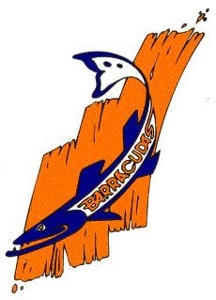14.0 NUTRITION
14.1 Selecting Foods for Performance and Health
Many swimmers are confused about what they should be eating for health and fitness. For swimmers to have the energy to train as well as have the nutrients to maintain health, they must be eating a wide variety of foods that match the amount of energy they expend during their daily routine and workouts.
The Eating Right Pyramid can be used as a tool to help select foods that will provide fuel for workouts, as well as choosing foods for maintenance of health.
For example, the pyramid lists foods from five food groups with an emphasis on three groups: whole grains, fruits and vegetables. Each of the five food groups provides some, but not all, of the nutrients you need. Foods in one group cannot replace those in another. No one-food group is more important than another for good health: you need them all.
The food pyramid assigns the grain to the base or largest section of the triangle. It is recommended that you consume 6 to 11 servings of grains like breads, rice, pasta, cereal and bagels each day. If you have training, I suggest you consume close to the 11 servings a day. That will ensure you have enough carbohydrates to fuel your practices.
Fruits and vegetables fill the next slightly smaller section. It is recommended that you consume 2 to 4 servings of fruits per day, as well as 3 to 5 servings of vegetables per day. These foods also provide energy in the way of carbohydrates, but grains, fruits and vegetables, contain vitamins and minerals. If you don’t eat vegetables or fruits daily, then you may put yourself at risk for a vitamin and/or mineral deficiency.
The dairy group and meat group are in the next level. For your age, it is suggested that you eat 3 to 4 servings of low fat products daily as well as 2 to 3 servings of meat like low fat beef, chicken, fish, turkey or dried beans and peas.
The apex or smallest part of the pyramid are foods that are high in fat or concentrated sources of sugar, including butter, chips, candy, soda and French fries. These foods are calorie dense; that is, they provide more calories than nutrients. These products should be consumed sparingly in the diet. That doesn’t mean you can never have them, but they should be consumed only have you have fulfilled your nutrient requirements from the other food groups.
[From Jacqueline R. Berning, Nutrition Coordinator. Swimming Technique Magazine]
- Fat & Sugar
- Dairy 3-4 servings
- Meat 2-3 servings
- Fruits 2-4 servings
- Vegetables 3-5 servings
- Grain 6-11 servings
14.2 Watch what is eaten between meals.
If a swimmer needs a snack, try to avoid empty calories in favour of the following:
- Fruits: oranges, apples, bananas, etc.
- Vegetables: raw carrots or cauliflower.
- Whole grain crackers with cheese or yogurt.
- Bread with peanut butter and jelly.
Drinking adequate fluids is essential for top athletic performance. Why? In order to replace water lost during exercise. How much? Water is the fluid replacement of choice. Drinks with a high concentration of sugar and electrolytes cause dehydration by drawing water away from intra-cellular fluid. On a daily basis, swimmers must make sure they drink adequate fluids (at least 8 large glasses of water a day).
14.3 Eating on the day of the meet
If you know what to eat, when to eat and how much to eat on the day of the meet, chances are you will swim better. Here are some easy to follow tips:
- Eat a light meal, containing no more than about 450 calories, three to four hours before competing. This will make sure your stomach and upper intestine are empty.
- Make sure to include carbohydrates such as whole grain breads, buns, bagels, pasta, potatoes and/or carrots in your meals. These are the beast sources of energy.
- Drink lots of cool water, about one glass every quarter to half hour.
- If you drink juice or sports drink, dilute them with water or drink cool water afterwards to dilute them in your stomach.
- Eat small amounts of food (250 to 350 calories) regularly during the day.
- Avoid greasy foods, such as French fries or any fried foods, as they take a long time to digest.
- Plan what you are going to eat on the day of a competition ahead of time. Try eating these foods on certain training days.
If the plan works for you, use it for every competition.
[From Swimming with Alex Baumann. Jeno Tihanyi and Alex Baumann. Toronto: Key Porter Books, 1989]

